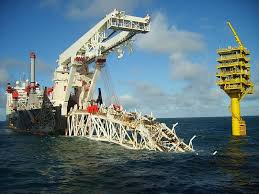For years, western European countries have worried about their access to gas, almost two-fifths of which is supplied by Russian pipes.
多年來,西歐國家都對(duì)自己獲取天然氣的渠道表示擔(dān)心,他們近五分之二的天然氣都是由俄羅斯管道提供。
These fears have not receded since in 2014 Russia cut off gas to Ukraine, the main thoroughfare through which its gas arrives in EU countries.
自2014年俄羅斯切斷烏克蘭這條輸往歐盟國家的主要天然氣通道以來,他們的擔(dān)憂就未曾消停。
Three times since 2006, rows with Russia have stopped gas flowing through Ukrainian pipelines, leaving customers down the line shivering.
自2006年起,與俄羅斯的三次爭端導(dǎo)致流經(jīng)烏克蘭管道的天然氣停運(yùn),這條線上的客戶冷的發(fā)抖。
EU leaders have long pondered other sources, such as American LNG, but the latter is far more expensive.
歐盟領(lǐng)導(dǎo)人們一直在考慮其他來源,比如美國液化天然氣(LNG),但后者要貴得多。
Such worries have flared again even as, in 2018, imports of Russian gas by EU countries reached a record high.
2018年這種擔(dān)憂再次加劇,恰巧此時(shí)歐盟進(jìn)口俄羅斯天然氣量創(chuàng)新高。
On December 29th Russia rejected European demands to release 24 Ukrainian sailors detained after it seized three of its neighbour's ships in November.
12月29日,俄羅斯拒絕了歐洲要求釋放24名烏克蘭海員的要求,此前11月其奪取了鄰國的三艘船只。

Ukraine is calling for fresh sanctions on Russia, raising the risk that it might once more cut off supplies.
烏克蘭要求對(duì)俄羅斯實(shí)施新的制裁,增加了俄羅斯再次切斷天然氣供應(yīng)的風(fēng)險(xiǎn)。
Meanwhile, European politicians are also fretting about Nord Stream 2 (NS2),
與此同時(shí),歐洲政治家們也正在為北溪-2號(hào)(NS2)項(xiàng)目擔(dān)憂,
a planned pipeline that would carry more Russian gas under the Baltic Sea directly to Germany.
這條擬議管道將沿波羅的海將更多俄羅斯天然氣直接運(yùn)送到德國。
On December 12th the European Parliament passed a resolution calling for the project to be cancelled, citing security reasons,
12月12日,歐洲議會(huì)通過一項(xiàng)決議,以安全因素為由要求取消該項(xiàng)目,
but with 370km of pipes already laid it looks hard to stop.
但是這條370千米長的管道已經(jīng)鋪排,似乎很難停止。
Another tack is to develop alternative conduits and supplies.
另一種方法是開發(fā)替代性的渠道和供應(yīng)。
On December 7th Italian authorities gave the final approval for the construction of the last leg of the Southern Gas Corridor (SGC),
12月7日,意大利當(dāng)局最終批準(zhǔn)建立南部天然氣走廊 (SGC)的最一段,
an EU scheme to import natural gas from the Caspian region.
這是從里海地區(qū)進(jìn)口天然氣的一項(xiàng)歐盟計(jì)劃。
The project is more than three-quarters complete and workers are beginning to extend the pipeline beneath the Adriatic Sea to Italy.
該項(xiàng)目完成了四分之三,工人們正開始將亞得里亞海下的管道延展至意大利。
If all goes according to plan, a $40bn jigsaw of pipes from Azerbaijan will start supplying western Europe from 2020.
如果一切按計(jì)劃進(jìn)行,那么從阿塞拜疆延伸出的一條價(jià)值400億美元的拼接管道將從2020年開始為西歐供應(yīng)天然氣。
But instead of increasing energy security, the SGC may do more to emphasise how hard it is for Europe to reduce its dependence on Russia.
但是SGC不但沒有提高能源安全,它可能還更多的強(qiáng)調(diào)了歐洲想要降低對(duì)俄羅斯的依賴有多么的困難。
Planners in the European Commission had initially proposed the construction of a pipeline from Iran or Turkmenistan.
歐洲委員會(huì)的規(guī)劃人員最初建議從伊朗或土庫曼斯坦修建一條管道。
But Iran is under sanctions and Turkmenistan sells most of its gas production to China, hence the shift to import from Azerbaijan.
但是伊朗正遭受制裁,土庫曼斯坦將它大部分的產(chǎn)氣量賣給了中國,因此,轉(zhuǎn)而從阿塞拜疆進(jìn)口。
譯文由可可原創(chuàng),僅供學(xué)習(xí)交流使用,未經(jīng)許可請勿轉(zhuǎn)載。












